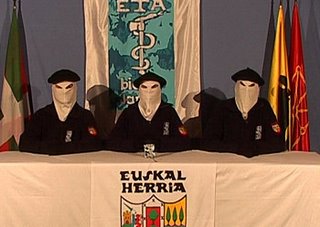
The process in the Basque Country is "in a situation of evident crisis" due to "the mean attitude of the political parties," Basque armed organization ETA said in a statement published in the pro-independence daily Gara.
ETA accused the ruling Spanish Workers' Socialist Party (PSOE) and the Basque Nationalist Party (PNV, in power in the so called Basque Autonomous Region), of "distorting and emptying the process of its contents."
The statement in Gara, normally used to publish claims by the armed Basque group, said that the two parties "are trying to build a process in line with their interests and their needs."
After having observed for nearly five months a permanent ceasefire that it decreed on March 22, the organization considers that the political parties "have not lived up to their responsibility."
"Instead of taking in-depth measures to feed this process and to build a democratic framework in the Basque country, they have acted blindly to wear down the positions of the Basque pro-independence left," ETA said.
A repressive attitude was "incompatible with the development of a negotiating process," it added, referring to the arrests of more than 50 people said to be close to or members of ETA since the cease fire was declared .
"If the attacks against Euskal Herria (the Basque Country) continue, ETA will reply," the group warned.
It claimed that "political, military and economic oppression" against the Basque Country was ongoing and that France and Spain "continue to use all their repressive machinery against the pillars that transform us into a nation."
ETA announced a "permanent ceasefire" in March and Prime Minister Jose Luis Rodriguez Zapatero three months later said discussions would open soon with the separatist organization.
Well informed sources assured that negotiations between ETA and the Spanish goverment went ahead for 8 months until last February when an agreement was reached. ETA agreed to call a permanent ceasefire while the Spanish government agreed to make public their respect to the Basque citizens' decissions on their future. They also agreed to not to arrest any activist.




